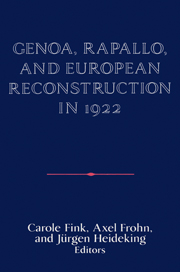Book contents
- Frontmatter
- Introduction
- 1 Beyond Revisionism: The Genoa Conference of 1922
- 2 The Genoa Conference of 1922: Lloyd George and the Politics of Recognition
- 3 A Rainy Day, April 16, 1922: The Rapallo Treaty and the Cloudy Perspective for German Foreign Policy
- 4 Reparations in 1922
- 5 Germany and the United States: The Concept of World Economic Interdependence
- 6 American Policy Toward Debts and Reconstruction at Genoa, 1922
- 7 French Plans for the Reconstruction of Russia: A History and Evaluation
- 8 The Oil Problem and Soviet-American Relations at the Genoa Conference of 1922
- 9 Italy at the Genoa Conference: Italian-Soviet Commercial Relations
- 10 The European Policy of Czechoslovakia on the Eve of the Genoa Conference of 1922
- 11 The Genoa Conference and the Little Entente
- 12 The Role of Switzerland and the Neutral States at the Genoa Conference
- 13 The Genoa Conference and Japan: A Lesson in Great-Power Diplomacy
- Maps
- Appendix
- Bibliography
- Contributors
- Index
7 - French Plans for the Reconstruction of Russia: A History and Evaluation
Published online by Cambridge University Press: 05 January 2013
- Frontmatter
- Introduction
- 1 Beyond Revisionism: The Genoa Conference of 1922
- 2 The Genoa Conference of 1922: Lloyd George and the Politics of Recognition
- 3 A Rainy Day, April 16, 1922: The Rapallo Treaty and the Cloudy Perspective for German Foreign Policy
- 4 Reparations in 1922
- 5 Germany and the United States: The Concept of World Economic Interdependence
- 6 American Policy Toward Debts and Reconstruction at Genoa, 1922
- 7 French Plans for the Reconstruction of Russia: A History and Evaluation
- 8 The Oil Problem and Soviet-American Relations at the Genoa Conference of 1922
- 9 Italy at the Genoa Conference: Italian-Soviet Commercial Relations
- 10 The European Policy of Czechoslovakia on the Eve of the Genoa Conference of 1922
- 11 The Genoa Conference and the Little Entente
- 12 The Role of Switzerland and the Neutral States at the Genoa Conference
- 13 The Genoa Conference and Japan: A Lesson in Great-Power Diplomacy
- Maps
- Appendix
- Bibliography
- Contributors
- Index
Summary
France's policy toward Soviet Russia at the time of the Genoa Conference has been described both in the official government publications that appeared shortly afterward and in subsequent monographs. However, the preparations for the conference, its various transformations, and the strategy and tactics of its participants have received little attention.
The private files of a number of French civil servants who took part in the preparations for the Genoa Conference provide revealing evidence about the above matters; they also permit a better understanding of this crucial period of French diplomacy with its mounting concern that France, just emerging from postwar reconstruction, was descending from the top of a wave and had to defend itself from both friend and foe. It was feared that considerable damage had already been incurred and there was only a very narrow margin for action to regain control.
At the end of 1921, diplomats and statesmen in Moscow, London, and Berlin called for an international conference to discuss the reentry of Russia into the European system, the settlement of the problem of German reparations, and the revival of traditional trade patterns that had been distorted by war and revolution. They hoped that this would restore peace, order, and prosperity to Europe. However, the various proponents of the conference were largely motivated by feelings of national interest, and some of their schemes would explode like bombs during the course of the Genoa Conference.
- Type
- Chapter
- Information
- Genoa, Rapallo, and European Reconstruction in 1922 , pp. 131 - 148Publisher: Cambridge University PressPrint publication year: 1991

